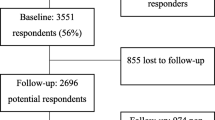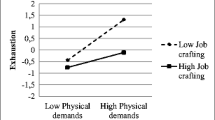Abstract
Purpose
The presence of chronic health conditions (CHCs), without sufficient personal and job resources, can impede one’s ability to effectively perform work tasks and manage job demands. The aim of this study was to evaluate the level of job burnout and perceptions of work health management interference (WHMI) and organizational health climate (OHC) among employees with varied levels of work ability (WA). We also examined relationships among these variables and with sociodemographic and job-related variables (e.g., age, number of physician-diagnosed conditions).
Methods
A convenience sample of 878 adults living and working in the United States who responded to a recruitment message via professional listservs/email lists and social media participated in a non-experimental, cross-sectional online survey. Participants reported sociodemographic and job-related items, as well as measures to evaluate WA, burnout, WHMI, and OHC.
Results
Statistically significant differences in burnout, WHMI, and OHC were observed across WA groups. Workers with poor WA reported the highest levels of overall burnout, WMHI, and the least supportive OHC. A more supportive OHC was associated with lower burnout. A strong inverse relationship between WA and the number of physician-diagnosed conditions was observed; weak relationships between WA and age, as well as WA and managerial status, were found.
Conclusion
Employees with lower levels of WA tended to report higher levels of burnout and WHMI and lower levels of OHC. Findings provide a foundation for future research to examine causal relationships among these variables and to inform actions to both preserve WA and support worker well-being.
Similar content being viewed by others
Data Availability
The dataset generated during and analyzed during the current study are available from the corresponding author on reasonable request.
References
Ilmarinen J. The work ability index (WAI). Occup Med. 2007;57(2):160. https://doi.org/10.1093/occmed/kqm008.
Tuomi K, Huuhtanen P, Nykyri E, Ilmarinen J. Promotion of work ability, the quality of work and retirement. Occup Med. 2001;51(5):318–24. https://doi.org/10.1093/occmed/51.5.318.
Tuomi K, Ilmarinen J, Jahkola A, Katajarinne L, Tulkki A. Work Ability Index. 2nd ed. Helsinki: Finnish Institute of Occupational Health; 1998.
Cadiz DM, Brady G, Rineer JR, Truxillo DM. A review and synthesis of the work ability literature. Work Aging Retire. 2019;5(1):114–38. https://doi.org/10.1093/workar/way010.
McGonagle AK, Bardwell T, Flinchum J. Perceived work ability: a constant comparative analysis of workers’ perspectives. Occup Health Sci. 2022;6:207–46. https://doi.org/10.1007/s41542-022-00116-w.
Boelhouwer IG, Vermeer W, van Vuuren T. Work ability, burnout complaints, and work engagement among employees with chronic diseases: job resources as targets for intervention? Front Psychol. 2020;11:1805. https://doi.org/10.3389/fpsyg.2020.01805.
McGonagle AK, Fisher GG, Barnes-Farrell JL, Grosch JW. Individual and work factors related to perceived work ability and labor force outcomes. J Appl Psychol. 2015;100(2):376–98. https://doi.org/10.1037/a0037974.
National Centers for Chronic Disease Prevention and Health Promotion. About chronic disease. 2022. https://www.cdc.gov/chronicdisease/about/index.html. Accessed 23 Oct 2023.
Centers for Disease Control and Prevention. Disability impacts us all. 2023. https://www.cdc.gov/ncbddd/disabilityandhealth/infographic-disability-impacts-all.html. Accessed 19 Oct 2023.
Abramson A. Burnout and stress are everywhere. Monit Psychol. 2022;53(1):72.
Ahola K, Toppinen-Tanner S, Huuhtanen P, Koskinen A, Väänänen A. Occupational burnout and chronic work disability: an eight-year cohort study on pensioning among Finnish forest industry workers. J Affect Disord. 2009;115(1):150–9. https://doi.org/10.1016/j.jad.2008.09.021.
World Health Organization. Burn-out an “occupational phenomenon”: International Classification of Diseases. 2019. https://www.who.int/news/item/28-05-2019-burn-out-an-occupational-phenomenon-international-classification-of-diseases. Accessed 22 Oct 2023.
Demerouti E, Mostert K, Bakker AB. Burnout and work engagement: a thorough investigation of the independency of both constructs. J Occup Health Psychol. 2010;15(3):209–22. https://doi.org/10.1037/a0019408.
Maslach C. Burned-out. Hum Behav. 1976;9:16–22.
Schaufeli WB, Desart S, De Witte H. Burnout Assessment Tool (BAT)—development, validity, and reliability. Int J Environ Res Public Health. 2020;17(24):9495. https://doi.org/10.3390/ijerph17249495.
Demerouti E, Bakker AB, Peeters MCW, Breevaart K. New directions in burnout research. Eur J Work Organ Psychol. 2021;30(5):686–91. https://doi.org/10.1080/1359432X.2021.1979962.
Salvagioni DAJ, Melanda FN, Mesas AE, González AD, Gabani FL, Andrade SM. Physical, psychological and occupational consequences of job burnout: a systematic review of prospective studies. PLoS ONE. 2017;12(10):e0185781. https://doi.org/10.1371/journal.pone.0185781.
Glise K, Hadzibajramovic E, Jonsdottir IH, Ahlborg G. Self-reported exhaustion: a possible indicator of reduced work ability and increased risk of sickness absence among human service workers. Int Arch Occup Environ Health. 2010;83(5):511–20. https://doi.org/10.1007/s00420-009-0490-x.
Hakanen JJ, Bakker AB, Schaufeli WB. Burnout and work engagement among teachers. J Sch Psychol. 2006;43(6):495–513. https://doi.org/10.1016/j.jsp.2005.11.001.
Viotti S, Guidetti G, Sottimano I, Martini M, Converso D. Work ability and burnout: what comes first? A two-wave, cross-lagged study among early childhood educators. Saf Sci. 2019;118:898–906. https://doi.org/10.1016/j.ssci.2019.06.027.
McGonagle AK, Schmidt S, Speights SL. Work-health management interference for workers with chronic health conditions: construct development and scale validation. Occup Health Sci. 2020;4(4):445–70. https://doi.org/10.1007/s41542-020-00073-2.
Awa WL, Plaumann M, Walter U. Burnout prevention: a review of intervention programs. Patient Educ Couns. 2010;78(2):184–90. https://doi.org/10.1016/j.pec.2009.04.008.
Moran ET, Volkwein JF. The cultural approach to the formation of organizational climate. Hum Relat. 1992;45(1):19–47. https://doi.org/10.1177/001872679204500102.
Feldt T, Hyvönen K, Mäkikangas A, Kinnunen U, Kokko K. Development trajectories of Finnish managers’ work ability over a 10-year follow-up period. Scand J Work Environ Health. 2009;35(1):37–47. https://doi.org/10.5271/sjweh.1301.
Tuomi K, Vanhala S, Nykyri E, Janhonen M. Organizational practices, work demands and the well-being of employees: a follow-up study in the metal industry and retail trade. Occup Med. 2004;54:115–21. https://doi.org/10.1093/occmed/kqh005.
Gragnano A, Miglioretti M, Frings-Dresen MHW, de Boer A. Adjustment between work demands and health needs: development of the work–health balance questionnaire. Rehabil Psychol. 2017;62(3):374–86. https://doi.org/10.1037/rep0000121.
Zweber ZM, Henning RA, Magley VJ, Faghri P. Considering the differential impact of three facets of organizational health climate on employees’ well-being. Sci World J. 2015;2015:407232. https://doi.org/10.1155/2015/407232.
Figueredo J-M, García-Ael C, Gragnano A, Topa G. The mediating role of work-health balance in the relationship between perceived work ability and affective job satisfaction. Psihol Teme. 2021;30(3):547–72. https://doi.org/10.31820/pt.30.3.8.
Zweber ZM, Henning RA, Magley VJ. A practical scale for multi-faceted organizational health climate assessment. J Occup Health Psychol. 2016;21(2):250–9. https://doi.org/10.1037/a0039895.
Hobfoll SE. Conservation of resources: a new attempt at conceptualizing stress. Am Psychol. 1989;44(3):513–24. https://doi.org/10.1037/0003-066X.44.3.513.
Demerouti E, Bakker AB, Nachreiner F, Schaufeli WB. The job demands-resources model of burnout. J Appl Psychol. 2001;86(3):499–512. https://doi.org/10.1037/0021-9010.86.3.499.
de Zwart BC, Frings-Dresen MH, van Duivenbooden JC. Test-retest reliability of the Work Ability Index questionnaire. Occup Med. 2002;52(4):177–81. https://doi.org/10.1093/occmed/52.4.177.
González-Domínguez ME, Fernández-García E, Paloma-Castro O, González-López RM, Rivas Pérez MP, López-Molina L, García-Jiménez J, Romero-Sánchez JM. Work ability index: psychometric testing in aeronautical industry workers. Saf Health Work. 2024;15(1):80–6. https://doi.org/10.1016/j.shaw.2023.12.001.
Radkiewicz P, Widerszal-Bazyl M. Psychometric properties of work ability index in the light of comparative survey study. In: Costa G, Goedhard, Willem JA, Ilmarinen J, editors. Assessment and promotion of work ability, health and well-being of ageing workers: proceedings of the 2nd international symposium on work ability; 18-20 Oct 2004; Verona, Italy. International congress series no. 1280. San Diego: Elsevier; 2005. p. 304–9.
de Beer LT, Schaufeli WB, Bakker AB. Investigating the validity of the short form burnout assessment tool: a job demands-resources approach. Afr J Psychol Assess. 2022;4:95. https://doi.org/10.4102/ajopa.v4i0.95.
Geisen, E. Improve data quality by using a commitment request instead of attention checks. 2022. https://www.qualtrics.com/blog/attention-checks-and-data-quality/. Accessed 31 Mar 2024.
Qualtrics. Response quality. 2023. https://www.qualtrics.com/support/survey-platform/survey-module/survey-checker/response-quality/. Accessed 17 Oct 2023.
van den Berg S, Burdorf A, Robroek SJ. Associations between common diseases and work ability and sick leave among health care workers. Int Arch Occup Environ Health. 2017;90:685–93. https://doi.org/10.1007/s00420-017-1231-1.
Seeberg KGV, Skovlund SV, Bláfoss R, Thomassen K, Malchow-Møller L, Sundstrup E, Andersen LL. The interplay between multimorbidity, physical work demands and work ability: cross-sectional study among 12,879 senior workers. Int J Environ Res Public Health. 2022;19(9):5023. https://doi.org/10.3390/ijerph19095023.
Koreshi SY, Alpass F. Predictors of work ability and quality of life in older New Zealanders with and without an arthritis diagnosis. Australas J Ageing. 2022;41(1):e1–7. https://doi.org/10.1111/ajag.12981.
Cook A, Zill A. Individual health status as a resource: analyzing associations between perceived illness symptom severity, burnout, and work engagement among employees with autoimmune diseases. Appl Psychol. 2023. https://doi.org/10.1111/apps.12464.
du Bois K, Sterkens P, Lippens L, Baert S, Derous E. Beyond the hype: (how) are work regimes associated with job burnout? Int J Environ Res Public Health. 2023;20(4):3331. https://doi.org/10.3390/ijerph20043331.
Pullen E, Fischer MW, Morse G, Garabrant J, Salyers MP, Rollins AL. Racial disparities in the workplace: the impact of isolation on perceived organizational support and job satisfaction. Psychiatr Rehabil J. 2023;46(1):45–52. https://doi.org/10.1037/prj0000543.
Franke F, Felfe J, Pundt A. The impact of health-oriented leadership on follower health: development and test of a new instrument measuring health-promoting leadership. Ger J Hum Resour Manag. 2014;28(1–2):139–61. https://doi.org/10.1177/239700221402800108.
Kaluza AJ, Schuh SC, Kern M, Xin K, Van Dick R. The importance of organizational health climate for employee health: a multilevel cascading model. Acad Manag Proc. 2018;2018(1):11709.
Pischel S, Felfe J. “Should I tell my leader or not?” Health-oriented leadership and stigma as antecedents of employees’ mental health information disclosure intentions at work. J Occup Environ Med. 2023;65(1):74–85. https://doi.org/10.1097/JOM.0000000000002688.
Näsi E, Perkiö M, Kokkinen L. The complexity of decreased work ability: individuals’ perceptions of factors that affect returning to work after sickness absence. Int J Environ Res Public Health. 2021;19(1):113. https://doi.org/10.3390/ijerph19010113.
Airila A, Hakanen JJ, Schaufeli WB, Luukkonen R, Punakallio A, Lusa S. Are job and personal resources associated with work ability 10 years later? The mediating role of work engagement. Work Stress. 2014;28(1):87–105. https://doi.org/10.1080/02678373.2013.872208.
ResearchMatch. About us. (n.d.). https://www.researchmatch.org/about/. Accessed 31 Mar 2024.
Funding
This project was funded with an internal grant from the University of Minnesota Duluth Department of Psychology.
Author information
Authors and Affiliations
Contributions
Both authors contributed to the study conception, design, material preparation, data collection, and funding acquisition. JMS conducted data cleaning and data analysis. The first draft of the manuscript was written by JMS and both authors commented on previous versions of the manuscript. Both authors read and approved the final manuscript.
Corresponding author
Ethics declarations
Competing Interests
Julie M. Slowiak and Mariah McDonough declare that they have no relevant financial or non-financial interests to disclose.
Ethical Approval
All procedures followed were in accordance with the ethical standards of the responsible committee on human experimentation (institutional and/or national) and with the Helsinki Declaration of 1975, as revised in 2000. Approval was obtained from the Institutional Review Board of the University of Minnesota, who determined this study met the requirements for exemption (Date: November 7, 2022; No: STUDY00017535).
Consent to Participate
Agreement to participate was obtained electronically from all individuals for whom data are included in this study.
Consent for Publication
Not applicable.
Additional information
Publisher's Note
Springer Nature remains neutral with regard to jurisdictional claims in published maps and institutional affiliations.
Rights and permissions
Springer Nature or its licensor (e.g. a society or other partner) holds exclusive rights to this article under a publishing agreement with the author(s) or other rightsholder(s); author self-archiving of the accepted manuscript version of this article is solely governed by the terms of such publishing agreement and applicable law.
About this article
Cite this article
Slowiak, J.M., McDonough, M. Job Burnout, Work Health Management Interference, and Organizational Health Climate Among Employees with Varied Levels of Work Ability. J Occup Rehabil (2024). https://doi.org/10.1007/s10926-024-10198-8
Accepted:
Published:
DOI: https://doi.org/10.1007/s10926-024-10198-8




